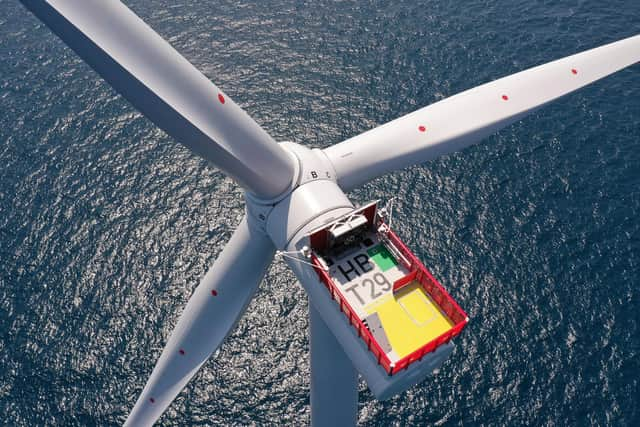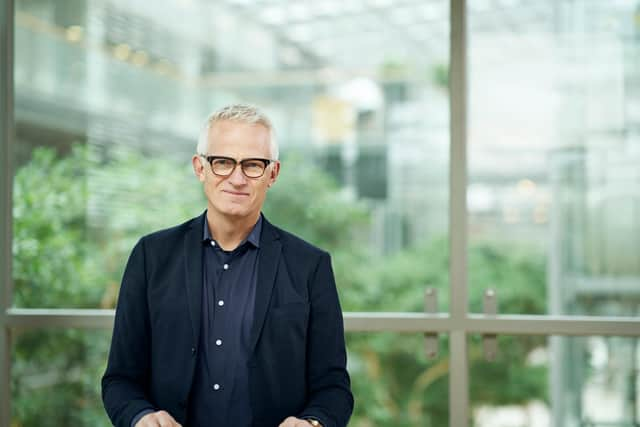Scotland can be proud of its net-zero vision and now must build on its progress - Mads Nipper comment
Achieving it, and keeping climate change below 1.5 degrees Celsius is, I believe, as much a leadership challenge as a technological or economic one, and the energy industry has a vitally important role to play. The production and consumption of energy is responsible for more than 70 per cent of man-made global greenhouse gas emissions, which is why immediately accelerating the transition to renewable forms of energy is critical, if we are going to reach net zero.
There is good cause for hope. Electricity from renewable wind and solar sources has become cheaper than energy from fossil fuels in many parts of the world, and the International Energy Agency points out that all the technologies needed for the necessary cuts in global emissions by 2030 already exist. Analysis from McKinsey & Company shows that more than 85 per cent of the emissions reductions we need by 2050 can be achieved with technologies that are either already mature, or in the early-adoption phase.


Advertisement
Hide AdAdvertisement
Hide AdYet, if this is the case – why is the global adoption of renewable energy not growing even faster than it is now?
One reason is the sheer amount of investment still needed to transition the entire world to renewables. Ørsted has invested £14 billion into UK clean energy over the last decade, but we and our wider industry stand ready to invest much, much more, if we are to reach net zero. Private-sector businesses must step up here and work closely with government – only together can we create the right frameworks to encourage enough renewable energy investment.
Scotland has been a leading player, achieving a rate of decarbonisation to be proud of, which has been helped by the government setting clear targets and creating policies that encourage green investment.
When countries commit to strong, mandatory climate policies and renewables targets, it sends a clear signal to investors and the market that the energy transition is both an immediate focus and a long-term priority. Which is why the Scottish Government’s ambitious target of achieving net zero by 2045 and 11 gigawatts of offshore wind power by 2030 are proving so important, and effective.


Now, governments everywhere must improve the availability, affordability, and predictability of space for wind and solar, if we are to see similar progress at a global scale. Renewable electricity generation is indeed expanding its share of the energy mix, but it still needs to grow eight times faster than the current rate if we are to meet the goals of the Paris agreement.
Every delay puts more distance between us and the possibility of limiting warming to 1.5 degrees. We don’t have another month, week, or day to waste.
There is also further work to do, modernising our current energy infrastructure systems to make them futureproof for renewables. While wind and solar projects get a lot of attention, investments to upgrade and expand electricity grids are just as important as newer innovations such as floating wind power.
Harmony
However, the green energy transition must also happen in a way that’s in harmony with people and nature. This means ensuring the benefits, especially the creation of good-quality, sustainable jobs, are felt at local community level.
Advertisement
Hide AdAdvertisement
Hide AdIf we are to achieve a just transition, jobs must be protected wherever possible, and alternative opportunities created whenever they cannot, through, for example the transitioning of current oil and gas workers to new green roles within the renewable energy sector. Indeed, tapping into all the pools of talent we can, to access diverse perspectives, ideas, experiences, and different problem-solving abilities will prove invaluable as we take on all the challenges of building the infrastructure needed to decarbonise our society.
Creating jobs with green technologies is an important part of a fair journey to net zero, and so is helping current workers stay with their employer, as energy-intensive industries adapt and reduce their carbon output. This includes hard-to-abate sectors such as aviation and shipping, and the industrial manufacturing of chemicals, glass, cement and steel, which combined account for around 20 per cent of global emissions.
Here, renewable hydrogen, which is essential for full industrial decarbonisation by 2050, alongside other green fuels, must be developed and deployed at scale. This will reduce emissions while ensuring these industries can continue to operate sustainably across Scotland and the UK.
Ambition
Overall, Scotland has one of the most ambitious net-zero targets in the world, and as a company that’s committed to creating a world that runs on green energy, we applaud that ambition and commitment.
I am particularly excited about the potential for the projects that we will see resulting from ScotWind, the first round of offshore wind leasing in Scottish waters for a decade. It’s a huge opportunity for those successful bidders to play a vital role in Scotland’s net-zero journey.
The disruption over the past two years has given many of us an opportunity to take stock and reflect on what we want from the next ten years and beyond. In previous decades when society has faced major challenges, whether delivering huge infrastructure programmes or facing significant economic headwinds, we have shown that we can pull together to accomplish great things.
Making the right choices now and putting in place the right regulation, processes and guidelines can ensure we face this challenge successfully and meaningfully accelerate our progress to a more sustainable, low-carbon future.
I’m confident that through continued collaboration between government, the private sector and local communities, we can deliver environmental, economic and societal benefits for everyone that will improve peoples’ lives for generations to come.
Advertisement
Hide AdAdvertisement
Hide AdMads Nipper, chief executive of renewable energy company Ørsted
A message from the Editor:
Thank you for reading this article. We're more reliant on your support than ever as the shift in consumer habits brought about by coronavirus impacts our advertisers.
If you haven't already, please consider supporting our trusted, fact-checked journalism by taking out a digital subscription.
Comments
Want to join the conversation? Please or to comment on this article.
